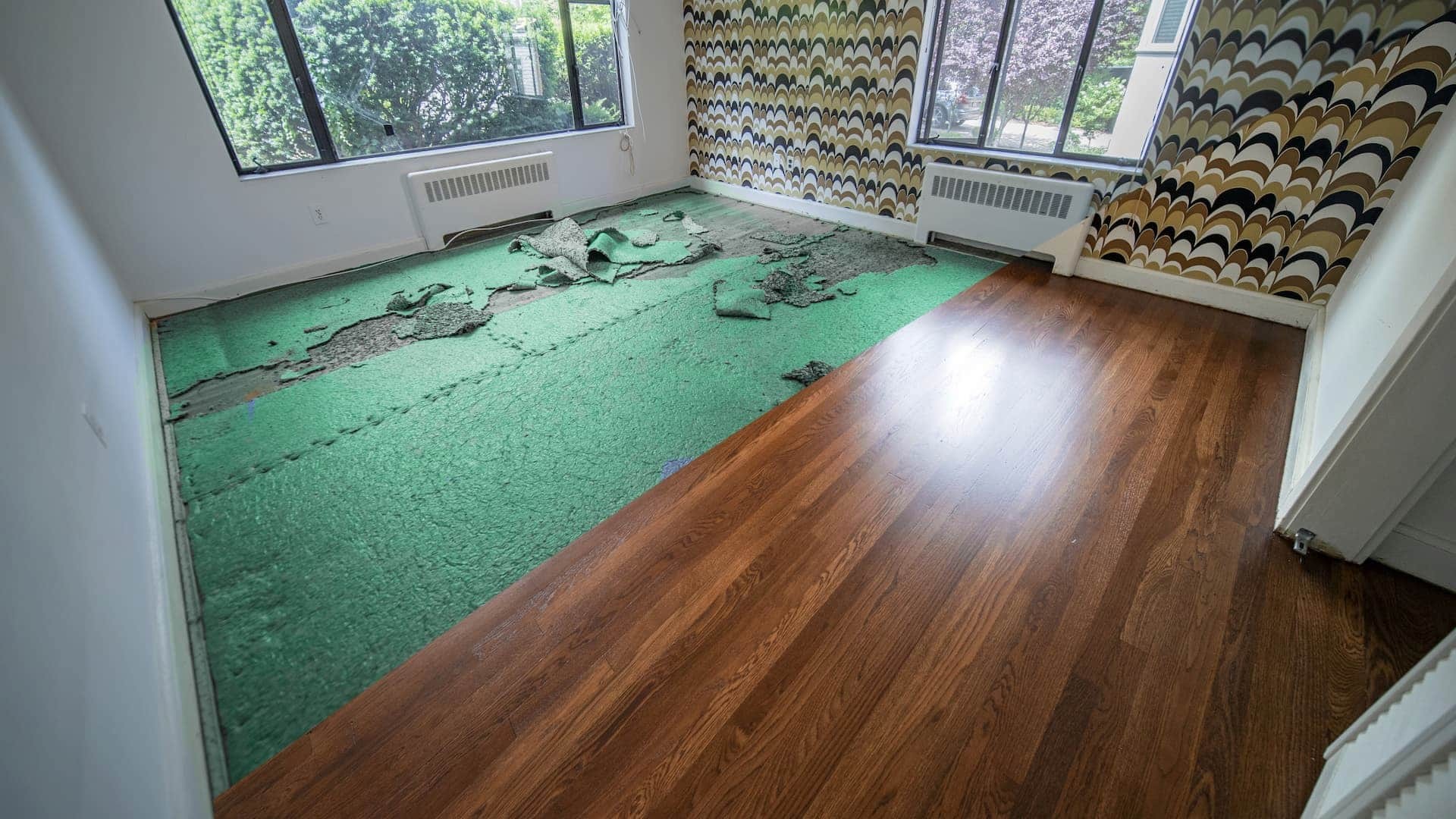For homeowners, the decision of whether to replace or refinish hardwood floors is a common one. In this article, we'll help you understand which option is more appropriate for your situation. We'll consider the overall condition of your solid hardwood, the extent of the area affected—whether it's the entire surface or just a few square foot patches—and the potential benefits of hardwood restoration. Understanding these factors is crucial in making an informed decision on whether to refinish hardwood floors or opt for a complete replacement.
Refinishing Hardwood Floors
Refinishing a hardwood floor involves sanding down the existing surface to remove scratches, dents, and stains. Next, a new stain and finish are applied. This procedure extends the life of the wood floor and brings it back to its former beauty.
Benefits of Refinishing
- Cost-Effectiveness: Refinishing a hardwood floor is generally less expensive than replacing the entire hardwood floor.
- Preserving Character: It maintains the original charm and unique characteristics of the hardwood floor.
- Environmental Consideration: Less wasteful as it recycles existing materials.
Ideal Situations for Refinishing
- Floors with superficial damages like scratches or faded finish.
- Floors that haven't been refinished multiple times.
- When preserving the historical value of the hardwood floor is a priority.
Refinishing is a practical choice for wood floors that require minor cosmetic work but are structurally sound. When you opt to refinish hardwood floor, you're not only restoring their beauty but also protecting them for future years. This hardwood floor refinishing process involves meticulous work to ensure every inch of the floor is evenly treated, preserving its texture and grain. Refinishing hardwood floor is an investment in your property, enhancing both its appearance and longevity. It's a specialized task that brings out the best in your hardwood flooring.
Replacing Hardwood Floors
Sometimes, the condition of hardwood floors requires a full replacement. This is especially true in the following scenarios:
Scenarios Necessitating Replacement
- Structural Damage: Floors with underlying issues like water damage or subfloor problems.
- Severe Wear and Tear: Floors that have sustained significant damage beyond superficial marks, such as deep scratches, warps, or termite infestation.
- Multiple Refinishings: Floors that have been refinished several times to the point where more hardwood refinishing is not possible.
Advantages of Replacing
- Modernization: Opportunity to update your home with contemporary styles and wood types.
- Addressing Irreversible Damages: Completely resolves deep and structural damages, ensuring a safer and more durable wood floor.
- Customization: Replacing allows for complete customization your engineered hardwood floor in terms of layout, plank size, and wood species.
Choosing to replacing hardwood floor can transform your space, offering both aesthetic and functional upgrades.
Cost Comparison: Refinishing vs. Replacing
To help you understand the financial implications, here is a comparison of the costs of refinishing a hardwood floor and replacing hardwood floors.
| Factor | Refinishing | Replacing |
|---|---|---|
| Material Costs | Lower (stain, finish) | Higher (new wood planks) |
| Labor Costs | Generally lower | Higher due to installation |
| Duration | Shorter, cost-effective | Longer, more labor-intensive |
| Longevity | Extends existing floor life | New floor, longer lifespan |
| Total Cost | Less expensive option | More costly but valuable for extensive damage |
Comparative Analysis
--
- Refinishing hardwood flooring is more cost-effective for floors with minor damage and can significantly extend the life of existing hardwood.
- Replacing becomes a financially sound decision when floors have substantial structural damage or when a complete style overhaul is desired.
Time and Convenience Factors
When deciding between refinishing and replacing your hardwood floors, it's important to consider how each option impacts your time and daily life.
| Refinishing | Replacing | |
|---|---|---|
| Duration | typically 4-5 days | generally takes longer than refinishing |
| Inconvenience | Requires emptying the room, and the process can be noisy and dusty. | More intrusive, as it involves removing the old floor and installing new ones. |
| Drying Time | Floors cannot be used while the finish is drying. | New floors are often ready to use immediately after installation. |
While refinishing is quicker and less disruptive, replacing offers a long-term solution with more immediate usability post-installation.
Aesthetic Considerations
The choice between refinishing hardwood floors and replacing hardwood floors greatly impacts the visual appeal of your space.
Refinishing
- Enhanced Natural Beauty: Brings out the original character and grain of the engineered wood.
- Customization: Allows for changing the stain color, offering a refreshed look.
- Consistency: Maintains a uniform appearance with the home's historical aesthetic.
Replacing
- Complete Transformation: Offers the chance to modernize with new styles, colors, and wood species.
- Versatility: Enables a complete change in plank size or layout, aligning with current trends.
- Revitalization: Transforms the space with a completely new and updated look.
Case Studies
Weles Hardwood Flooring has documented several projects that demonstrate the dramatic transformations possible through both refinishing and replacement. These visual examples demonstrate the significant impact that each option can have on a home's appearance. Visit our portfolio page to see more of our work!
Environmental Considerations
The environmental impact of deciding between refinishing and replacing hardwood floors is an important consideration.
Refinishing:
- Reduced Waste: Refinishing minimizes the amount of material discarded, as the existing wood is preserved.
- Lower Carbon Footprint: It involves less manufacturing and transportation of new materials.
Replacing:
- Sustainable Sourcing: When replacing, choosing sustainably sourced wood is key.
- Recycling Options: Old wood can often be repurposed or recycled, reducing landfill waste.
Professional Insights from Weles
Weles brings plenty of knowledge and experience to the table, making us a reliable option for your hardwood flooring needs.
Why Consult Weles Professionals?
- Expertise: Weles' crew specializes in both hardwood floor installation and refinishing, assuring high-quality results regardless of the project type.
- Attention to Detail: Our team prioritizes quality and attention in all aspects of flooring installation. Take a look at our portfolio to see for yourself
- Reputation: Weles is famous for their devotion to client pleasure and proficiency in hardwood flooring services, having received one of the highest 5-star rating on Google in New England.
Consulting with Weles pros is critical because they provide not just technical expertise, but also a thorough grasp of how to best fulfill your flooring requirements, assuring a successful conclusion for each project.
Conclusion
In summary, the decision to refinish or replace hardwood floor is influenced by a number of considerations, including cost, time, aesthetics, and environmental effect. Refinishing is less expensive and retains the floor's original beauty, whereas replacing transforms and modernizes your area completely.
Weles Hardwood Flooring offers experienced guidance and high-quality services, ensuring that your flooring selection is informed and suited to your individual requirements. Are you ready to revive your engineered hardwood floors? Get an estimate to explore your options and begin your hardwood flooring transformation.



